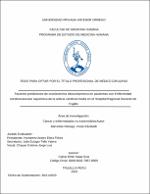Factores predictores de craniectomía descompresiva en pacientes con enfermedad cerebrovascular isquémica de la arteria cerebral media en el Hospital Regional Docente de Trujillo
Abstract
Objetivo: Determinar si la edad <50 años, extensión del infarto de >50% de la arteria
cerebral media, afectación adicional de las arterias cerebral anterior o posterior,
NIHSS > 17 y puntaje < 12 en la ECG, glucemia de ingreso > 128.5 mg/dl, son
predictores de craniectomía descompresiva en pacientes con ECV isquémica de la
ACM
Material y métodos: Estudio observacional, retrospectivo y analítico de casos y
controles. La muestra de estudio estuvo conformada por 123 pacientes con
diagnóstico de ECV isquémica de la arteria cerebral media ingresados en el Hospital
Regional Docente de Trujillo durante el período 2009-2022, divididos en dos grupos,
casos, conformado por 41 pacientes a quienes se les realizó craniectomía
descompresiva y control, conformado por 82 pacientes a quienes no se les realizó
craniectomía descompresiva. El análisis estadístico se realizó con la aplicación de la
prueba Chi cuadrado más el cálculo del Odds Ratio (OR), considerando significancia
del 5%.
Resultados: La extensión del infarto mayor del 50% de la arterial cerebral media
(p=0.000, OR=6.218; IC95% 2.696-14.341); la afectación adicional de las arterias
cerebral anterior y/o posterior (p=0.000, OR=13.902; IC95% 5.572-34.688); el NHISS
≥ 17 puntos (p=0.000, OR=22.654; IC95% 8.287-60.299); el puntaje ECG <12 puntos
(p=0.000, OR=14.27; IC95% 6.566-45.423); y la glicemia al ingreso (p=0.001,
OR=28.33; IC95% 10.235-78.434) > 128.5 mg/dl fueron los factores predictores para
craniectomía descompresiva.
Conclusión: La extensión del infarto mayor del 50% de la arterial cerebral media, la
afectación adicional de las arterias cerebral anterior y/o posterior, el NHISS ≥ 17
puntos, el puntaje ECG <12 y la glicemia al ingreso > 128.5mg/dl fueron factores que
predicen la necesidad de una craniectomía descompresiva en pacientes con ECV
isquémica de la arteria cerebral media Objective: To determine if age <50 years, infarct extension of >50% of the middle
cerebral artery, additional involvement of the anterior I posterior cerebral arteries,
NIHSS > 17 and score < 12 on the ECG, admission glycemia > 128.5 mg/dl predict
the need for a decompressive craniectomy in patients with ischemic stroke of the
middle cerebral artery.
Material and methods: Observational, retrospective and analytical study of cases
and controls. The study sample consisted of 123 patients diagnosed with ischemic
CVD of the middle cerebral artery admitted to the Regional Hospital during the period
2009-2022, divided into two groups, cases, made up of 41 patients who underwent
decompressive craniotomy and control, made up of 82 patients who did not undergo
decompressive craniectomy. The statistical analysis was carried out with the
application of the Chi square test plus the calculation of the Odds Ratio (OR),
considering significance of 5%.
Results: The extension of the infarction greater than 50% of the middle cerebral artery
(p=0.000, OR=6.218; 95% CI 2.696-14.341); additional involvement of the anterior I
posterior cerebral arteries (p=0.000, OR=13.902; 95% CI 5.572-34.688); the
NHISS ≥ 17 points (p=0.000, OR=22.654; 95% CI 8.287-60.299); ECG score <12
(p=0.000, OR=14.27; 95% CI 6.566-45.423); and hyperglycemia > 128.5 at admission
(p=0.001, OR=28.33; 95% CI 10.235-78.434) were the predictive factors for
decompressive craniectomy.
Conclusion: Infarct extension greater than 50% of the middle cerebral artery,
additional involvement of the anterior I posterior cerebral arteries, NHISS ≥ 17 points,
ECG score <12, and glycemia > 128.5 mg/dl on admission were predictors of the need
for decompressive craniectomy in patients with ischemic CVD of the middle cerebral
artery
Collections
- Medicina Humana [2969]


